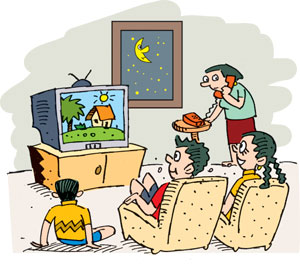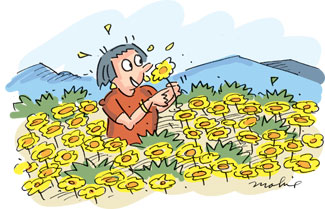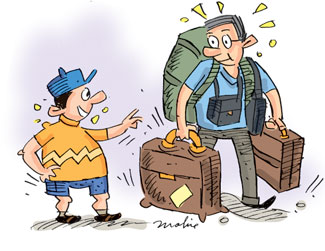|

by R. S. Karunaratne
Prepositions of time
We use the prepositions 'at, in' and 'on' when we talk about time. We
use 'at' for exact times.
My interview is at 9.30 a.m. tomorrow.
Shall we meet at breakfast?
Where will you be at noon today?
The minister will open the new school building at 3.30 p.m. on Monday.
The train leaves for Kandy at 11 a.m.
We use 'in' to point to a period of time.
|

We watch television at night. |
Children attend school in the morning.
She was born in April, 1990.
Sam died in 2010.
Shall we meet in the evening?
Flowers bloom in spring.
We use 'on' to point to a particular day or date.
Indra was born on Friday.
The next meeting will be held on Monday.
The exam will be held on the 3rd of July.
What are you doing on Sunday?
The elections will be held on 20th of September.
'On' is used when the event ends in 'day'.
We were in Japan on Christmas day.
Are you going to throw a party on your birthday?
Pensioners go to the post office on the pension day.
Sorry, Nethmi observes Sil on Poya Day.
Where do you want to go on holidays?
'At' is used when the event does not end in the word 'day'.
The chief guest delivered a speech at the annual prize giving
ceremony.
There was a big crowd at his funeral.
I was at the cinema when you rang me.
She bought a copy of Robinson Crusoe at the International Book Fair.
Don't talk too much when you are at meals.
Note: Do not use 'at, in' or 'on' before any of the following words:
|

Flowers bloom in spring. |
each, every, next, one, last.
The bus stopped at each halt.
We do not go to school every day.
She is leaving for England next month.
I met him in Colombo one day.
Sarath did not come to school last Friday.
Although the word 'night' refers to a period of time, we do not use
'in' with it.
We learn English at night.
On some days we go for a walk at night.
We watch television at night.
Do not travel at night, the city is not safe.
Activity
Fill in the blanks with 'at, in' or 'on'. Check your answers with the
key.
1. The International Book Fair will be held ............ September
17.
2. The postal trade unions are meeting ............. 3 p.m. today.
3. Sita spent two weeks in Malaysia ........... 1987.
4. Many supermarkets are open ........... mercantile holidays.
5. The train leaves for Kandy ............. 2 p.m.
6. My grandfather has a nap ............ the afternoon.
7. Sri Lanka celebrates its Independence Day ................ February.
8. I sent her a slab of chocolate ........... her birthday.
9. We usually meet at Mercy's house ............. Sunday morning.
10. My family members never meet .............. lunchtime.
Key:
1. on 2. at 3. in 4. on 5. at 6. in 7. in 8. on 9. on 10. at
Quiz on homophones
Homophones are words pronounced alike but having different spelling
and meaning or usage. Here is a quiz to test your knowledge of
homophones. In each of the following sets only one homophone is given.
Write the other homophone on the dotted line. The meaning of the other
homophone is given to facilitate your attempt. Check your answers with
the key.
1. Air: atmosphere ................. : inheritor
2. Bail: security given ..................: bundle of goods
3. Bald: hairless ..................: shouted
4. Bare: uncovered ..................: wild animal
5. Boy: male child ...................: anchored float
6. Braid: to plait together ...................: cried like an ass
7. Coat: garment ...................: shed
8. Fair: market ...................: price paid for a journey
9. Frays: fights ...................: part of a sentence
10. Gilt: covered with thin gold ...................: wickedness
11. Him: objective case of 'he' ...................: song of praise
12. Knead: to work flour into dough ...................: want
13. Meat: flesh used as food ...................: to encounter
14. Reek: smoke ...................: to take revenge
15. Right: correct ..................: solemn ceremony
16. Rye: kind of grain ..................: twisted
17. Sew: to use needle and thread ..................: therefore
18. Son: male offering ..................: heavenly body
19. Steal: to purloin ..................: metal
20. Wait: to stay for something ..................: heaviness
Key:
1. Heir, 2. Bale, 3. Bawled, 4. Bear, 5. Buoy, 6. Brayed, 7.Cote,
8.Fare, 9. Phrase, 10. Guilt, 11. Hymn, 12. Need, 13. Meet, 14. Wreak,
15. Rite, 16. Wry, 17. So, 18. Sun, 19. Steel, 20. Weight
Starters :
Correct use of
'Can', 'Can't',
'Could', 'Couldn't'
'Can' is a modal verb that means 'to be able to.'
Can you speak in English?
Can she drive?
Can we compete with them?
Can they do it?
Can I come with you?
'Can' is followed by an infinitive verb without 'to'.
I can speak English.
You can drive the car.
He can learn English.
We can dance in the evening.
|

Could I help you with those heavy bags? |
They can sleep now.
'Cannot' (Can't) is the negative form of 'Can'.
I cannot speak Spanish.
You cannot teach me how to dance.
He cannot win the election.
We cannot wait here.
They cannot ill-treat her.
'Could' is the simple past of 'Can'. It is used to talk about what
someone or something was able to or allowed to do.
When I was younger I could run very fast.
Mother said we could watch television.
You said you could climb the mountain.
Nethmi said she could help me to write the essay.
Chandu said he could clean the cobwebs.
'Could' is followed by an infinitive without 'to'.
I am glad you could attend the party.
I am sure they could help me.
He was confident that he could pass the examination.
Nehara could dance before she met with an accident.
The stranger said he could recognize me.
'Could' is used as a more polite form of 'Can' when asking for
permission.
Could I speak to the principal?
Excuse me, could I sit here?
Could you call after 9 a.m.?
Could I help you with those heavy bags?
Could I go for a film show tonight?
'Could' is used as a more polite form of 'Can' when asking someone to
provide something or do something.
Could you lend me Rs 1,000?
Could you switch off the lights?
Could you close the door?
Could you bring my book tomorrow?
Could you call him now?
'Could' is used to express possibility.
Certain crimes could be prevented.
The principal could arrive any time now.
If you didn't wear the seatbelt, the police could fine you.
He could help you when you are in need.
'Could not' (Couldn't) is the negative form of 'Could'.
Sorry, I couldn't make you out?
I was busy, I couldn't bring my notebook.
Why couldn't you write the essay?
I went to the police station but they said they couldn't help me.
Mother couldn't recognize her schoolmate at the party.
[Activity ]
Fill in the blanks with 'can', 'cannot' (can't), 'could' or 'could
not' ('couldn't'). Check your answers with the key.
1. am sorry, I .............. swim.
2. .............. you play cricket?
3. She ................drive.
4. When she was younger she ............... run very fast.
5. We ............... come to your party.
6. He got the job because he ............. speak three languages.
7. Have you seen my wallet? I ............ find it.
8. I like this room because I ............. see the sea from the window.
9. She was tired but she .................. sleep.
10. He spoke very quickly and I .............. understand him.
Key:
1. cannot 2. Can 3. can't 4. could 5. can't 6. could 7. can't 8. can
9. couldn't 10. couldn't. |

